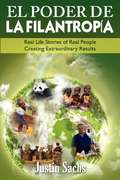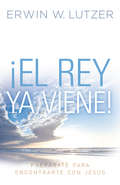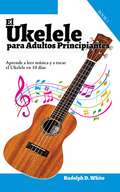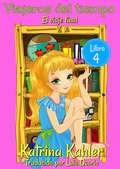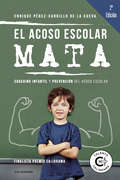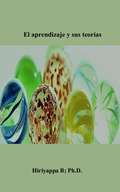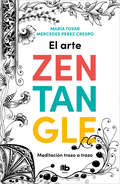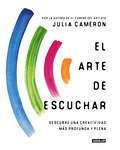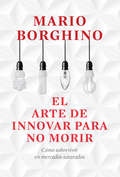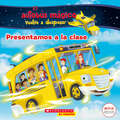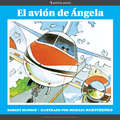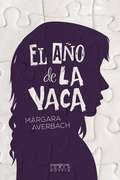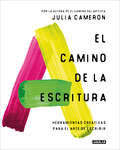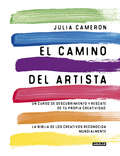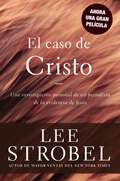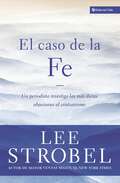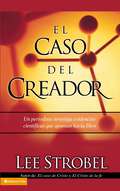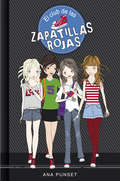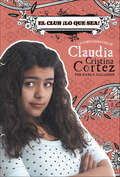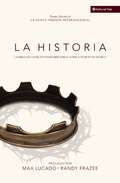- Table View
- List View
El Poder De La Filantropía
by Justin Sachs Daniel Pardo SchneiderEl poder de la filantropía. Historias reales de personas reales creando resultados extraordinarios.
El Rey ya viene: Prepárate para encontrarte con Jesús
by Erwin W. LutzerLa percepción pública sobre el regreso de Cristo revela una alarmante falta de entendimiento de la profecía bíblica. En ¡El Rey ya viene!, el pastor Erwin Lutzer nos brinda su enseñanza perspicaz sobre un tema que deja incluso a creyentes maduros y estudiantes de la Biblia con preguntas difíciles y conclusiones poco claras. Para los que no creen en las profecías de los últimos tiempos, es una llamada de atención. Para aquellos que temen que no pueden saber nunca las respuestas, ¡El Rey ya viene! es un consuelo. Para cualquiera que esté dispuesto a pensar seriamente en el futuro, es una llamada alentadora y convincente a la acción. From panic to punch line, public perception about the return of Christ reveals an alarming lack of understanding of biblical prophecy. In The King Is Coming, Pastor Erwin Lutzer lends his knowledgeable, careful handling of a topic that leaves even mature believers and students with difficult questions and unclear conclusions. For the outsiders who doubt end-times prophecy, it's a wake-up call. For those afraid that they can't ever know the answers, The King Is Coming is a comfort. For anyone willing to take a serious look into the future, it is an encouraging and compelling call to action.
El Secreto: Descubrimiento - Libro 2
by Katrina KahlerEl Secreto- Libro 2: Descubrimiento continúa la historia llena de suspenso de Sam y el poder especial que tan desesperadamente ha intentado ocultar. Cuando su vecina, Tess tropieza accidentalmente con su secreto, decide que su nueva amistad con la linda chica que vive al lado ha terminado y teme lo peor. Sin embargo, él no está preparado para su reacción o para lo que suceda después. Escrita desde el punto de vista de Tess, esta historia te mantendrá al borde de tu asiento hasta el último capítulo en el que Tess descubre más de lo que esperaba. Este es un libro fabuloso para niñas que disfrutan leyendo sobre niños con poderes únicos y habilidades paranormales inusuales. Completo con drama, problemas de amistad, problemas actuales de intimidación, pelea de niños y un poco de romance, esta es una historia con la que todas las niñas de 9 a 12 años y mayores podrán relacionarse.
El Ukelele para Adultos Principiantes: Aprende a leer música y a tocar el Ukelele en 10 días
by Rudolph D. WhiteÉste estupendo libro fue inspirado por mi pasión de ayudar, tanto a los jóvenes como a los adultos, a aprender y perfeccionar el arte de tocar el Ukelele. Para aquellos amigos, que durante varios años han querido aprender, pero no saben por dónde empezar. En mis varios años de experiencia tocando y enseñando sobre el ukelele, he amalgamado diferentes técnicas y puntos beneficiosos que me gustaría compartir con todos mis estudiantes. En este libro, te guiaré todo el proceso, desde el principio del aprendizaje del Ukelele hasta el puro final. Cuando acabes este libro, serás capaz de tocar al menos una canción en el ukelele. Pero no cualquier canción, no será "Los Tres Ratones Ciegos" o algo por el estilo. ¡Vamos a tocar canciones legendarias! Vamos a tocar "Let it be" de los Beatles.
El Viaje Final (Viajero del tiempo #4)
by Katrina KahlerEl viaje final continúa la emocionante aventura en la que se encuentran Holly, su hermano mayor Oliver y su mejor amiga Kate después de que Holly descubre una máquina del tiempo en el ático de su casa. <p><p> ¿Podrán alguna vez superar el poder de Thadeus Banes y lograr regresar a la normalidad? ¿Podrán Holly y Oliver localizar a su padre y traerlo de vuelta a vivir con ellos de la forma que ellos esperaban? ¿Continuará la amistad de Zac con Holly o decidirá evitarla ahora que sabe la verdad? <p> Todas estas preguntas son respondidas en esta dramática conclusión de la serie. Viajeros en el Tiempo es un libro fabuloso para niñas y también un gran libro para niños y adolescentes que disfrutan de la emoción y la aventura que se encuentran en las historias sobre viajes en el tiempo.
El acoso escolar mata: Coaching infantil y prevención del acoso escolar
by Enrique Pérez-Carrillo De la cuevaEnseña a tus hijos e hijas a prevenir el acoso escolar. Este libro, pionero en su área, pretende que los padres y educadores tengan una guía de ayuda para que sus hijos e hijas crezcan con autoestima y confianza; y, de esta manera, puedan desarrollar todo el potencial del que disponen como seres humanos. El libro tiene dos partes. La primera habla del acoso escolar: qué es, cómo surge, cómo se desarrolla y el daño que puede causar. El relato del proceso de creación de nuestro Plan Nacional para la Prevención del Acoso Escolar, compartiendo con vosotros, queridos lectores y lectoras, las experiencias vitales que hemos tenido en el proceso. Experiencias emotivas que nos ayudan a entender la naturaleza del maltrato escolar. Pero es también un relato esperanzador sobre la valentía y la ternura. La segunda parte desarrolla diez enseñanzas que ayudarán a tus hijos a crecer con confianza y autonomía. Cada una de estas enseñanzas viene acompañada de un cuento que puedes leerles, o que pueden leer ellos mismos.
El aprendizaje y sus teorías
by Hiriyappa B Diana HernándezEs una redacción sencilla y completa de comportamiento de una persona y una organización con respecto a la adquisición del aprendizaje.
El arte Zentangle
by María Tovar Mercedes Pérez CrespoUn método único para reducir el estrés y desarrollar la creatividad. El arte Zentangle nos acerca a los antiguos secretos del yoga y el mindfulness con la sencillez de usar solamente papel y rotulador. Punto, círculo, línea recta, línea curva y línea doble curva: esto es todo lo que tienes que saber dibujar para practicar Zentangle. El Método Zentangle fue creado en Estados Unidos por Rick Roberts y Maria Thomas en 2004. El nombre hace referencia a la unión de las palabras «zen» (estado meditativo), y «tangle» (enredo), y se ha convertido, en pocos años, en una disciplina de gran seguimiento en todo el mundo.
El arte contemporáneo
by Francisco Calvo SerrallerDescubre cuáles han sido los principales cambios y movimientos del arte contemporáneo desde su nacimiento, en el siglo XVIII, hasta las últimas tendenciasLa pregunta más repetida en relación con el arte de nuestra época es fruto de la perplejidad: ¿qué significa? Pues su principal y revolucionaria característica es el rechazo a la tradición. ¿Cuál es, entonces, el fundamento de ese arte que ya no busca imitar selectivamente la realidad para plasmar su belleza? La respuesta es la libertad. El ejercicio de ésta implica no aceptar determinación dogmática ni canon preestablecido alguno. Esto explica por qué, todavía hoy, se discute no el valor de una obra, sino qué es el arte. Como el resto de los valores de nuestra época, se rige por el tiempo, cuyo fundamento es el cambio. Probablemente nunca llegaremos a una formulación definitiva acerca del significado del arte, pero ello no nos priva de la experiencia y, por lo tanto, del saber derivado de la historia de esa aventura.En esta obra, Francisco Calvo Serraller analiza cuáles han sido los principales cambios y movimientos del arte contemporáneo desde su nacimiento, en el siglo XVIII, hasta las últimas tendencias. Esta nueva edición, para la que el autor ha escrito un «Epílogo a modo de prólogo» y que está profusamente ilustrada, aportará a los conocedores una síntesis clara de arquitectura, pintura, escultura, fotografía y cine, que permitirá ordenar conceptos, y a los profanos una clave para acercarse a este apasionante tema.
El arte de dudar
by Óscar De la BorbollaEl arte de dudar es una guía para que la vida sea algo más que un acto biológico. Un libro de trazos filosóficos. Con todas las complicaciones que tenemos en la vida, resulta difícil acostumbrarnos a cavilar y contemplar los momentos que rigen nuestro tiempo. Pero hay quienes revierten las costumbres, y personajes como De la Borbolla reivindican esa actividad tan necesaria. Con temas como nuestra incapacidad para comunicarnos, el porqué del deseo y los pájaros que rondan nuestra cabeza con ideas suicidas o necias, esta colección de ensayos compactos nos ayudará a comprender el mundo con la especial mirada de uno de los escritores mexicanos más queridos, Óscar de la Borbolla. En palabras del autor: "Este libro es el residuo de la etapa más conflictiva de mi vida: a mi caos personal sirvió de fondo un momento histórico caracterizado por la incertidumbre, la desesperanza y el cambio vertiginoso entodos los órdenes. Las breves reflexiones que lo componen aparecieron semanalmente en el periódico virtual sinembargo.mx y constituyeron mi madero para mantenerme a flote. Por ello, corregidas y articuladas, las ofrezco a quienes desean detenerse a reflexionar sobre los asuntos más preocupantes de hoy y de todos los tiempos: el sentido de la vida, el estado del conocimiento, el deseo, la comunicación, la felicidad, el valor de nuestros actos, la razón, la realidad, el tiempo, el engaño, la memoria, la identidad, etcétera".
El arte de escuchar: Descubre una creatividad más profunda y plena
by Julia CameronEl arte de escuchar: un libro creativo por la autora de El camino del artista Deja que este libro te brinde claridad, conexión y rumbo. Descubre una creatividad más profunda y plena. DE LA AUTORA DE EL CAMINO DEL ARTISTA, CON CINCO MILLONES DE EJEMPLARES VENDIDOS. EL ARTE DE ESCUCHAR es tu guía para la transformación personal y creativa. Con el éxito sin precedentes de El camino del artista, Julia Cameron cambió la vida de millones de lectores. Ahora ofrece un nuevo método de transformación personal y creativa para escuchar mejor nuestro entorno, a los demás y a nosotros mismos. En seis semanas, a medida que cultivas la capacidad de escuchar el entorno y el silencio que te rodea, tu atención será más acusada y ello redundará en tu sanación, sabiduría y claridad. Por encima de todo, El arte de escuchar te ayudará a abrirte a un nuevo mundo de conexión y a una creatividad que se reflejará en todos los aspectos de tu vida. En unos tiempos de ruido innecesario, escuchar es avanzar en el camino del artista. «La reina del cambio».The New York Times Reseñas de El camino del artista:«Sin El camino del artista no existiría Come, reza, ama».Elizabeth Gilbert «El camino del artista descubre y fomenta el artista que llevamos dentro... Si siempre has deseado perseguir un sueño creativo, jugar y crear con palabras o pinturas, esta obra te ayudará a iniciarte y aprender poco a poco todo tipo de técnicas para prestar atención; y en eso, al fin y al cabo, consiste ser un artista. Se trata de aprender a prestar atención».Anne Lamott «Este es un libro que aborda un tema delicado y complejo. Quienes lo utilicen encontrarán una valiosa herramienta para conectar con su creatividad».Martin Scorsese
El arte de innovar para no morir
by Mario Borghino19 estrategias de éxito para competir en mercados saturados ¿Está por iniciar su negocio y no sabe cómo? ¿Su negocio no está creciendo como antes? ¿Las utilidades de su negocio decrecen día con día? ¿Su mercado se ha saturado de competidores? ¿Ya no sabe cómo controlar la guerra de precios? ¿Sus competidores copian día con día sus estrategias? ¿Su negocio ya no es negocio? ¿Ya no deja lo mismo? ¿La guerra de precios está sangrando sus utilidades? ¿Nacen nuevas empresas día con día haciendo lo mismo que usted? ¿Cada día es más difícil lograr sus metas? ¿Sus productos ya no son tan rentables como antes? ¿Los competidores copian sus productos? ¿Ya no sabe qué hacer para incrementar sus ventas? ¿Su producto estrella ya dejó de serlo? ¿No se le ocurren nuevas ideas para crecer su negocio? ¿Ha intentado nuevas estrategias y no crece? Este libro puede salvar su negocio: ¡No puede dejar de leerlo!
El autobús mágico vuelve a despegar: Presentamos a la clase (El autobús mágico vuelve a despegar)
by Samantha BrookeThe Magic School Bus returns with an updated cast of characters in a brand-new Netflix show!Buckle your seatbelts! The Magic School Bus is back and ready to ride again! In Spanish. Meet Walkerville's newest class with this introduction to The Magic School Bus, perfect for the series' youngest fans. Learn all about your favorite students from the original series like Keesha, Ralphie, D.A., and Arnold, plus a few new friends.¡Abrochense los cinturones de seguridad! ¡El autobus magico esta de regreso y listo para volver a despegar! Un libro en espanol. Conozca la clase mas nueva de la Escuela de Walkerville con esta libro que presenta a los personajes de la serie. Es perfecto para los fanaticos mas jovenes de la serie.
El avión de Angela
by Robert Munsch Michael MartchenkoMientras buscaba a su papá, que se había perdido en el aeropuerto, Ángela terminó en la cabina de mando de un avión. Pronto decide apretar un botón, y después otro . . . y después otro . . . Este es un libro electrónico de diseño fijo, que mantiene el mismo diseño y formato de la edición impresa del mismo libro.
El año de la vaca
by Margara AverbachGanadora del Primer Premio para Cuento Infantil de las Madres de Plazade Mayo (1992), esta historia transcurre en una escuela secundaria yaborda el tema de la identidad y la dictadura. «Fue así: la foto sale volando de la mano de Laura y flota por debajodel banco, hacia delante, hacia la Vaca, que no se da vuelta para nada#No es el único gesto que intriga a Sebastián. Todos comienzan adescubrir que hay algo intenso y raro en ella, "la nueva". Y lo contaránde muchas maneras. Porque cada uno es testigo solo de su propiaexperiencia. Dice la autora: "Una historia es siempre una conversación yen la secundaria yo no podía contar historias. Me rodeaba de un silenciocasi sólido. Tal vez por eso, necesito escribir sobre el momento que unachica recupera la magia de tocar a otro con palabras, la magia de lacharla. En realidad, este libro es el encuentro de dos conversaciones:esa, la de mi angustia adolescente sola, y la de la angustia de losargentinos que no conocen su verdadero nombre».
El camino de la escritura: Herramientas creativas para el arte de escribir
by Julia CameronHerramientas creativas para el arte de escribir por la autora del bestseller El camino del artista. Un programa de seis semanas para sumergirte en el arte de escribir y sacar tu lado más creativo de la mano de la autora de El camino del artista. Una carta de amor a la escritura a través de la cual Julia Cameron comparte herramientas que cualquier persona puede utilizar y orienta cuidadosamente al lector para que recorra paso a paso el camino de la escritura. Se trata de una guía para todos aquellos que quieran trabajar en un proyecto creativo, tanto para quienes están empezando como para los escritores experimentados. Es un manual para fomentar la creatividad, desarrollar disciplina como escritor y animar a las personas a silenciar la crítica interior y seguir su intuición. Este libro es una compañía en tu viaje literario para lograr que la idea pueda para convertirse en una realidad. La autora explica técnicas muy útiles y brinda orientación respecto a temas comunes, entre ellos la procrastinación, cómo iniciar un proyecto y cómo lidiar con la duda y los plazos. El arte de escribir es una lectura fundamental para quienes hayan completado el programa de El camino del artista, y ayudará al lector a alcanzar su objetivo, se trate de una novela, una poesía, un guion de película, un monólogo, una canción o ese texto que has escrito o estás escribiendo en estos momentos.La tarea del escritor es escribir, y si tú tienes el deseo de hacerlo, merece la pena que te pongas manos a la obra ya mismo: el camino de la escritura no ha hecho más que empezar. Julia Cameron lleva más de una década enseñando y perfeccionando los métodos sobre los que se articula El camino del artista. Ha estado dedicada al mundo de las artes durante veinte años como guionista de cine y televisión en Hollywood, como directora y como productora de largometrajes independientes y documentales. También ha sido una reputada periodista de The Washington post, The New York Times y las revistas Rolling Stone y Vogue. Recientemente ha colaborado en un proyecto de la universidad de Northwestern donde ha aplicado sus técnicas para eliminar el bloqueo creativo. Además trabaja como profesora de técnicas narrativas y guion en su taller The Vien of Gold.Esta autora superventas de más de cuarenta libros es conocida popularmente como «la madrina» de la creatividad. Sus herramientas se fundamentan en la práctica, no en la teoría. Hasta la fecha se han vendido más de cinco millones de ejemplares de El camino del artista, y ha sido traducido a cuarenta idiomas. Reseñas de El camino del artista:«Sin El camino del artista no existiría Come, reza, ama».Elizabeth Gilbert «El camino del artista descubre y fomenta el artista que llevamos dentro... Si siempre has deseado perseguir un sueño creativo, jugar y crear con palabras o pinturas, esta obra te ayudará a iniciarte y aprender poco a poco todo tipo de técnicas para prestar atención; y en eso, al fin y al cabo, consiste ser un artista. Se trata de aprender a prestar atención».Anne Lamott«Este es un libro que aborda un tema delicado y complejo. Quienes lo utilicen encontrarán una valiosa herramienta para conectar con su creatividad».Martin Scorsese
El camino del artista: Un curso de descubrimiento y rescate de tu propia creatividad (Cuatro Estaciones Ser.)
by Julia CameronUn curso de descubrimiento y rescate de tu propia creatividad. La mayoría de nosotros anhelamos ser más creativos y muchos creemos que conseguir serlo es imposible porque en realidad no lo somos. Este planteamiento es erróneo y lo único que provoca es que nuestra creatividad se quede dormida en nuestro interior junto a nuestra verdadera esencia. A menudo nos negamos el placer de soñar, de conseguir lo que siempre hemos deseado, de rechazar nuestros impulsos naturales, nuestra propia personalidad. El camino del artista nos enseña a crear con mayor libertad a través de la utilización consciente de una serie de herramientas que nos ayudarán a terminar con el bloqueo creativo. Su efecto es similar al yoga y la práctica constante de la escritura diaria -páginas matutinas-, los encuentros con el artista, el juego y una exhaustiva introspección guiada harán que modifiquemos nuestra conciencia y nos abramos a un nuevo horizonte imaginativo. Gracias a las enseñanzas de la reconocida escritora y artista Julia Cameron iniciaremos un camino creativo y espiritual que nos hará remontarnos a nuestra verdadera naturaleza, y en doce lecciones magistrales seremos capaces de rehabilitar nuestra creatividad, de entregarnos a la imaginación y encontrar el sentido de nuestra existencia. Un recorrido revelador por nuestras inseguridades y nuestros miedos, pero también por nuestros recuerdos, nuestros objetivos y por lo mejor de nosotros mismos. Una obra necesaria para escritores, poetas, actores, pintores, músicos o para cualquier otro individuo creativo. «La creatividad no tiene ni fondo ni techo aunque haya partes de su crecimiento que sean lentas. El ingrediente que se precisa es la fe -entendida como confianza férrea en uno mismo-. Este libro te muestra el camino y la fe necesarios para liberar la creatividad de las personas. Tómalo como un ejercicio para abrirte a una nueva perspectiva y libera al artista que llevas dentro». Julia Cameron
El caso de Cristo: Una investigación personal de un periodista de la evidencia de Jesús (Case for ... Series)
by Lee StrobelESTE IMPACTANTE EBOOK NO ES UNA NOVELA. ES UNA BÚSQUEDA SIN RESERVAS DE LA VERDAD ACERCA DE UNA DE LAS FIGURAS MÁS APASIONANTES DE LA HISTORIA AL FINAL. EL LECTOR DETERMINARÁ EL VEREDICTO EN EL CASO DE CRISTO.Si usted fuera periodista, ¿cómo enfuertaría las noticias de una historia tan grande que podría eclipsar por completo a todos los demás hechos del mundo? ¿Cómo llevaría a cabo su investigación? ¿Cuántas preguntas capciosas haría? ¿Con cuánta cautela consultaría a los grandes expertos para obtener detalladas y veraces respuestas? Un experimentado periodista va en busca del gran suceso de la historiaEl PROYECTO: Determinar si hay evidencia creíble de que Jesús de Nazaret es en verdad el Hijo de Dios.EL REPORTERO: Lee Strobel, educado en la facultad de Leyes de la Universidad Yale, antiguo editor legal de periódico Chicago Tribune y ganador de varios reconocimientos, con antecedentes de ateísmo.LOS EXPERTOS: Doce eruditos, con doctorados de la universidades de Cambridge, Princeton, Brandeis y otras prominentes instituciones, a quienes se les reconoce como autoridades sobre la vida de Jesús.LA HISTORIA: Al volver sobre su trayectoria espiritual, Strobel interroga a los expertos con preguntas difíciles y bien directas: ¿Qué tan confiable es el Nuevo Testamento? ¿Existe evidencia extra bíblica acerca de Jesús? ¿Hay alguna razón para creer que la resurrección fue en verdad un hecho histórico?...
El caso de la fe: Un periodista investiga las objeciones más difíciles contra el cristianismo
by Lee StrobelAlgunas personas sienten hambre espiritual; sin embargo, algo les impide satisfacerla. Las objeciones las atormentan. Las dudas se burlan de ellas. Sus corazones quieren volar hacia Dios, pero su inteligencia las mantiene en tierra firme.Lee Strobel empezó como un ateo, completamente convencido de que Dios no creó a las personas, sino que estas lo crearon a él en un esfuerzo por explicar lo desconocido y atenuar su temor a la muerte. En El caso de Cristo, Strobel describió su estudio de casi dos años de evidencia histórica que lo condujo al veredicto de que Dios en verdad existe y que Jesús es su único Hijo. No obstante, todavía luchaba con objeciones agobiantes, preocupaciones por asuntos llenos de emoción que dañaban a muchos que de otra manera abrazarían la fe. No se trataba de simples problemas teóricos, históricos o intelectuales. Las cuestiones que molestaban a Strobel estaban llenas de impacto emocional. Existen los tipos de enigmas que pueden detener, y lo hacen, a las personas en su camino cuando consideran convertirse en cristianos.En El caso de la fe, Lee Strobel sondea las preguntas más espinosas, a las que llama Las ocho grandes, que incluyen:Si hay un Dios amoroso, ¿por qué gime este mundo bajo tanto sufrimiento y maldad?Si en verdad Dios creó el universo, ¿por qué la ciencia obliga a tantos a concluir que la evolución responde por la vida?Si Dios es el supremo supervisor de la iglesia, ¿por qué esta ha tenido tanta hipocresía y brutalidad a través de las diferentes edades?Si en verdad a Dios le importan las personas que creó, ¿cómo envía a tantas de ellas a una eternidad de tortura en el infierno solo porque no creyeron en las debidas cosas acerca de él?Como experimentado periodista educado en la Facultad de Leyes de Yale, Strobel busca metódicamente los puntos a favor y hace preguntas audaces que cualquiera quisiera hacer y que le carcomen por dentro. Preguntas que construyen o destruyen la fe cristiana. Se niega a contemporizar o a dar clichés con elocuentes respuestas. Por el contrario, junta los hechos difíciles a través de entrevistas con nueve de los más prestigiosos eruditos y expertos. ¿El resultado? Respuestas sólidas, convincentes, fascinantes y sabias a sus preguntas más profundas. El caso de la fe le encaminará hacia una fe renovada y restaurada… o hacia su descubrimiento.
El caso del creador: Un periodista investiga evidencias científicas que apuntan hacia Dios.
by Lee StrobelDurante su época académica, Lee Stobel quedo convencido de que Dios estaba fuera de moda, lo cual era una creencia que influyó su subsiguiente carrera como periodista galardonado en el diario Chicago Tribune. La ciencia había logrado que la idea de una Creador fuera irrelevante; o por lo menos eso creía Strobel.Sin embargo, hoy día la ciencia apunta hacia una dirección distinta. En años recientes, un conjunto de investigaciones diversas e impactantes apoyan de manera creciente la conclusión de que el universo fue diseñado de forma inteligente. Al mismo tiempo, los representantes del darwinismo han titubeado a la luz de los hechos concretos y del razonamiento sólido.¿La ciencia ha descubierto a Dios? La fe está recibiendo, al menos, un inmenso impulso al darse a conocer nuevos descubrimientos acerca de la increíble complejidad de nuestro universo. Únase a Strobel en un nuevo examen de las teorías que alguna vez le mantuvieron lejos de Dios. A través de este recuento atractivo y fácil de leer, se encontrará con los asombrosos descubrimientos en los campos de la cosmología, biología celular, investigación del ADN, astronomía, física y conciencia humana que nos presentan evidencias sorprendentes en El caso del Creador.
El club de las zapatillas rojas (Serie El Club de las Zapatillas Rojas #Volumen 1)
by Ana PunsetLucía, Frida, Bea y Marta deciden sellar un pacto de amistad y fundan #ElClubDeLasZapatillasRojas. Lucía, Frida, Bea y Marta son inseparables, siempre lo han sido y siempre lo serán. Ahora deben enfrentarse a una difícil noticia: ¡Marta y su familia se va a vivir a Berlín! Parece que el mundo se acaba... pero pronto las cuatro amigas decidirán fundar un club que les permitirá estar unidas hasta el fin de los tiempos.
El club ¡Lo que sea! (La Complicada Vida de Claudia Cristina Cortez)
by Diana GallagherClaudia, Becca y Mónica tienen un club, el club "¡Lo que sea!". ¿Qué van a hacer ahora que Adam, el amigo de Claudia, quiere entrar al club? Adam no sigue las reglas del club y hace que todos la pasen mal, pero Claudia no quiere perder a uno de sus mejores amigos. Claudia, Becca, and Monica have their own club, the Whatever Club. What are they supposed to do when Claudia&’s friend Adam wants to join? He doesn&’t play by the club&’s rules, and he&’s making the Whatever Club miserable. But Claudia doesn&’t want to lose one of her best friends.
El club ¡Lo que sea!: La complicada vida de Claudia Cristina Cortez (Claudia Cristina Cortez en español)
by Diana G GallagherClaudia, Becca y Mo´nica tienen un club, el club "¡Lo que sea!". ¿Que´ van a hacer ahora que Adam, el amigo de Claudia, quiere entrar al club? Adam no sigue las reglas del club y hace que todos la pasen mal, pero Claudia no quiere perder a uno de sus mejores amigos.
El concurso de canto
by Francois Keyser Lorena GrancelliEl grupo de amigos se entera de que habrá un concurso de canto. Todos quieren competir por separado para obtener el primer puesto, pero pronto se dan cuenta de que combinar sus talentos puede ser una gran idea. ¿Ganarán el concurso? Este cuento pertenece a la serie The Junglies.
El corazón de la Historia: El diseño magistral de Dios para restaurar a su pueblo
by Randy FrazeeEl Corazon de la Historia te ayudara a ver la palabra de Dios bajo una luz nueva e inspiradora. En lo que parecen ser relatos desconectados de la Biblia descubriras una epica grandiose en desarrollo: la historia de Dios desde Genesis en adelante, y tu propia experiencia contenida alli. Para entender la Biblia, dice el autor y pastor Randy Frazee, uno necesita lentes bifocales, porque intervienen dos perspectivas. La Historia Secundaria, que son nuestras experiencias, relatoes de hombres y mujeres que interactuan con Dios en el curso diario de la vida. La Historia Primaria, que es la historia de Dios, el relato de su proposito grandioso, supremo, que combina todas las experiencias individuales como paneles en un mural unificado. En 31 capitulos, El Corazon de la Historia te abrira los ojos al plan maestro de Dios desarrollandose en la vida de los personajes biblicos, y en la tuya. Descubre la esencia de la Historia de Dios, y el gozo que viene al alinear tu historia con la de el.
